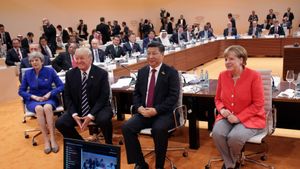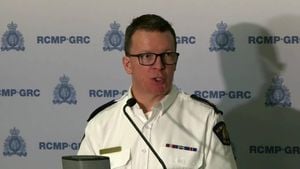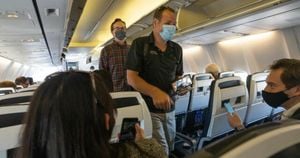Howard University is gearing up for what promises to be a monumental evening as it hosts election night events during the 2024 Presidential Election. This historically Black university, steeped in rich tradition and political activism, sets the stage for significant discussions and celebrations surrounding the electoral process.
Vice President Kamala Harris will join this vibrant scene, choosing her alma mater as the place to spend election night. The Vice President has been noticeably active leading up to the election, giving major focus to outreach efforts targeting Black voters. Harris graduated from Howard University in 1986, where she earned her degree in political science and economics. During her time at Howard, she became a proud member of Alpha Kappa Alpha sorority.
Harris’s connection to Howard runs deep, making her choice to return for such a pivotal event particularly symbolic. When she arrived at Howard, the excitement was palpable. Students, faculty, and alumni gathered to share their thoughts, hopes, and predictions as they awaited the results of the election.
While the momentum builds at Howard, it’s not lost on observers and political analysts alike just how important this election is for both Harris and President Joe Biden. Recent polling has indicated troubling signs for the Democrats within the Black voter demographic. According to recent surveys, Trump appears to be making surprising gains among this group, contrasting sharply with the overwhelming support Biden received back in 2020.
Notably, Harris's support among likely Black voters stands at around 78%, with 15% seeking to cast their votes for Trump, indicating shifts from previous elections. Particularly concerning for Harris's campaign is the decline of support from young Black males; recent polls show troubling trends among this demographic, with significant percentages indicating they might choose to vote for Trump.
Harris's strategy has heavily relied on bolstering her appeal among these key voter groups, recognizing the stakes involved not just for her ascendance but for the broader Democratic agenda. The Vice President's team has worked tirelessly to address concerns and connect with voters on the ground, especially as election day approaches.
Meanwhile, to nurture future leaders and inspire political engagement within the community, Howard University held talks led by Stacey Abrams, the inaugural Ronald W. Walters Endowed Chair for Race and Black Politics. Known for her captivating discussions and insightful analyses, Abrams recently addressed students on November 20, facilitating dialogues about the 2024 election and its ramifications.
Abrams engaged with students who were eager to voice their questions and sentiments about the election. She emphasized not just the significance of voting but also the importance of community involvement and activism beyond election day. “I am someone who believes in this country’s capacity for more,” Abrams stated, highlighting the role of young voters.
Through passionate discourse, Abrams tackled tough questions about misinformation, political representation, and the potential erosion of Black political agency. Topics of concern included the dangers of theocracy within American politics and the impact of recently changing legislation concerning rights historically afforded to marginalized communities, particularly women.
“It’s the intent to shift America from its constitutional responsibility of not having established religion to not only making Christianity the central pillar [of American government]…” Abrams warned, anchoring her argument within the historical struggle for civil rights.
Throughout the evening, the themes of collaboration and reliance on community were present as Abrams encouraged students to not shy away from active participation. “Black women are usually the most effective fighters because we are often the most targeted victim,” she declared, reinvigorated by the necessity of solidarity.
For many students at Howard, gathering together for election night is not merely about casting votes but also about envisioning the future. The urgency of civic responsibility was echoed as Abrams encouraged them to engage thoughtfully with their local governments, leveraging their voices to impact political discourse.
“Your obligation after you leave this room is to pick one thing and spend the next year talking about it,” she instructed, emphasizing continuous engagement. The call to action was clear: students should not only define themselves but also influence the narrative surrounding their community.
At the same time, the tension surrounding election night looms. With partisan divides deepening across the nation, Howard remains steadfast as it offers activists and thought leaders fertile ground for discussion. Harris’s decision to return during such significant moments signifies her commitment to amplifying voices often marginalized from mainstream politics.
On this election night at Howard University, the stakes are high, and the energy is electric. With influential figures like Harris and Abrams driving conversations, the campus pulses with anticipation and hope for the future, making it evident just how integral these young voices are for shaping the political discourse long after the ballots have been cast.
With everything on the line, Howard University stands as more than just an educational institution during this momentous electoral event; it is, once again, at the heart of America’s political awakening.



